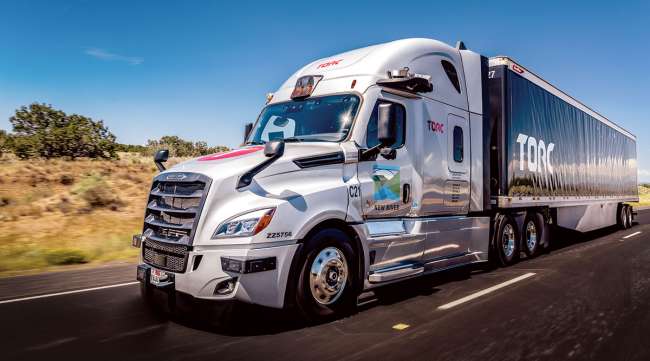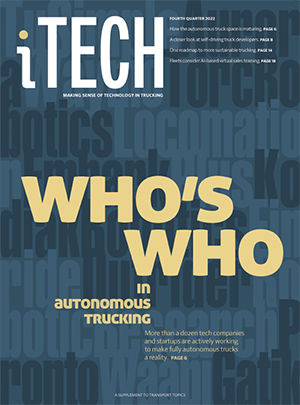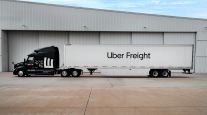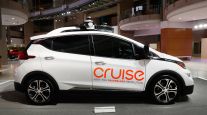Staff Reporter
Uber Freight and Torc Robotics Form Partnership on Autonomous Trucks

[Stay on top of transportation news: Get TTNews in your inbox.]
Uber Freight announced a deal that aligns it with a new partner in development of autonomous trucking services, and separately outlined how it is delving more deeply into where artificial intelligence might support its services in the years ahead.
Uber and Torc Robotics announced Dec. 7 the formation of a strategic partnership under which Uber Freight would incorporate its logistics network into Torc’s ongoing development and future deployment of autonomous trucks. The Uber Freight network represents $18 billion in active freight under management, it said.
“Torc is a proven pioneer in autonomous trucking, and we’re thrilled to collaborate with them on the road ahead,” Uber Freight CEO Lior Ron said. “We firmly believe that by collaborating with partners early on, we are helping incorporate the important voices of shippers and carriers across the Uber Freight network and shaping the future of freight with autonomous trucks. In partnering with Torc, we’re able to provide a leader in this space with rich insights.”
Torc said the information gathered will be used to inform its autonomous freight network design and expansion strategy. That includes determining optimal lanes and the management of autonomous loads with transfer hubs, it said.

Schmidt
“Our partnership with Uber Freight is a prime example of how working together with industry players will ensure the technology is integrated seamlessly, safely and efficiently,” Torc CEO Peter Vaughan Schmidt said. “This partnership is a natural expansion of our initial working relationship through [the Torc Autonomous Advisory Council], and leveraging Uber Freight’s data and insights will help our mission to commercialize autonomous trucks at scale by 2027.”
Uber Freight has been active on the autonomous truck vehicle front in recent years, forming partnerships with autonomous vehicle technology company Waymo as well as generative AI and autonomous technology company Waabi. It also operates a multiphase pilot program with Aurora.

Who's Who in the Autonomous Space
►Overview of Self-Driving Truck Development
Company Sketches
Click the links to jump to profiles of autonomous companies.
Aurora | Waymo | TuSimple | Gatik | Locomation | Torc Robotics | Waabi | Einride | Plus | Embark | Kodiak Robotics | Robotic Research | Outrider | Pronto
Uber Freight has been active on the autonomous truck vehicle front in recent years, forming partnerships with generative AI and autonomous technology company Waabi and autonomous vehicle technology company Waymo. It also operates a multiphase pilot program with Aurora.
These moves broadly fit with its overall approach to technology, highlighted by a Dec. 6 discussion Uber Freight hosted to discuss artificial intelligence in the logistics sector.
“In many models the machines are already beyond human levels and we’re going to see that continue to rise as both computing and data will rise over the next couple of years,” Ron said during the discussion. “We will see in our lifetime, and very soon, AI completely revolutionizing logistics.”
Ron believes this technological evolution makes sense considering that logistics is essentially a global optimization challenge with supply chain professionals trying to make sense of all of the constraints, complexities and data that come with it.
On one challenge in particular — reducing vehicle emissions — Ron pointed out that machine learning can help by optimizing routes and minimizing empty miles.
“Machines can do that more effectively, more efficiently, and solve that global constraint optimization problem better than us,” Ron said. “The opportunity lies in really unleashing the power of big data processing to allow us to inform better decision-making, better supply chain optimization, better outcomes for what we’re trying to do day-to-day. So, we fundamentally believe at Uber Freight that AI will transform logistics.”
Uber Freight has advanced this outlook by channeling its energies toward a series of priorities.
“I would say there’s four categories of transformation that we see,” Ron said. “Digitization, which is basically the precondition for everything. To do any better inference, to do any better decision, things need to be digitized. Then you want to automate that and connect all the dots. Then we’ll talk about machine learning, which is a simplistic way of actually learning once you have digitized stuff. And then the next frontier, generative AI.”
We will see in our lifetime, and very soon, AI completely revolutionizing logistics.
Uber Freight CEO Lior Ron
Image
Generative AI is artificial intelligence capable of generating different forms of media and information by using generative models that learn the patterns and structure of their input training data and then generate new data that has similar characteristics. Ron noted this technology can be used across supply chain operations, including optimizing warehouses.
“We see a prevalence of use cases and applications of generative AI in logistics across everything,” Ron said. “One of the interesting applications we see for generative AI is in the realm of self-driving. One of the companies that we have been partnering with is a company called Waabi. They are really putting a generative AI-first approach in everything it’s doing.”
Ron discussed one autonomous mobility initiative focused on use of a virtual simulator instead of trucks on the road. The effort is built around simulations to help an autonomous vehicle system better visualize and detect objects. From there, the technology can safely learn how to handle various conditions based on numerous permutations covering everything from traffic and emergencies to weather and construction zones.
“When you actually bring the driver to the physical road, you’re getting superior self-driving results because of all of that learning that happens in the simulator,” Ron said. “That’s not just a concept, it’s actually a reality.”
Want more news? Listen to today's daily briefing below or go here for more info:





